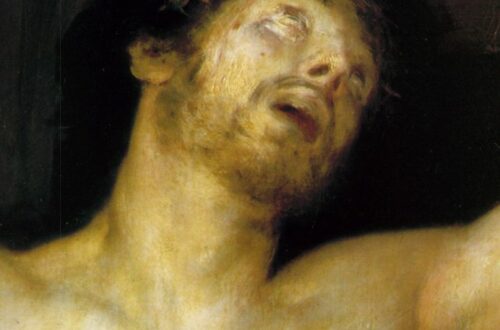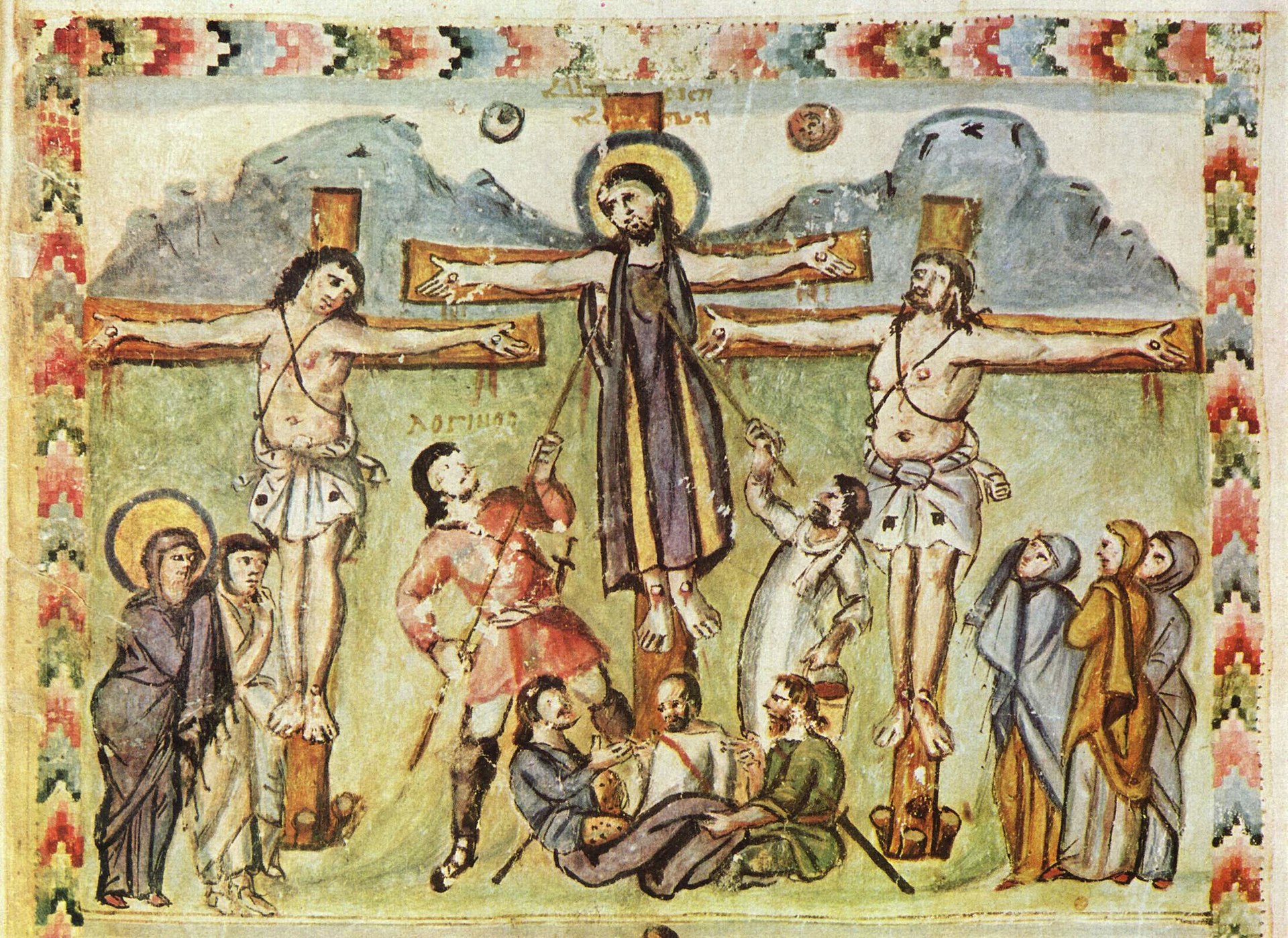For Slavoj Žižek, God is a concept, but a substantively empty one. He is the ghost in the literal sense, a haunting memory. However, for Žižek, “a materialist through and through,” one should pass through the sea of Christianity to the banks of materialism because, “Christianity is accessible only to a materialist approach—and vice versa: to become a true dialectical materialist, one should go through the Christian experience.”1
So what waters does he have in mind? What, for instance, does Žižek think about the central Christian doctrine of the atonement? On this topic, Žižek focuses on Paul. He sees Paul as a proto-marxist, a “radical Jew”2 who ignores Christ as teacher and organizes the church in terms of event (crucifixion and resurrection). As such, Paul is the institutionalizer of the atonement.3
The atonement, according to Žižek, is not the resolution of the problem of human sin. Indeed, there is really no such thing in the traditional sense. According to Žižek, evil is not the cause of humanity’s separation from God. Rather “Evil is not substantially different from Good, a positive force opposing it—Evil is substantially the same as Good, simply a different mode of (or perspective on) it.”4 Similarly, according to Žižek, salvation is found in what we consider to be the cause of the need for salvation – in the fall itself. Adam and Christ are one and the same, only seen from two perspectives.5
Re-reading an event until one’s perspective shifts is central to Žižek’s hermeneutic. A naïve reading can only be overcome by repetition until a new perspective emerges. This is especially true of ambiguities in the text. Žižek picks on divergent readings of pistis christou. Should we read this as a subjective or objective genitive? Žižek suggests that we should attempt both (a synthesis). Perhaps we should believe in Christ’s belief. Then, even if we do not truly believe we are assured that at least Christ was serious about his faith. However, Žižek points out that Jesus appears to loose his faith in his final moments (“why have you forsaken me?”). Perhaps, then, it is also in Christ’s doubt that we participate: “perhaps the true communion with Christ, the true imitato Christi, is to participate in Christ’s doubt and disbelief.”6
Žižek’s history of the doctrine of God can be rendered in Hegelian terms: God, the Absolute, becomes Christ and, in his hour of agony, discovers the impotence of God and dies leaving the Holy Spirit as animus to a new political community radicalized by the event. The political community then imitates Christ in its suffering, empowered by his “Spirit” (or ghost) and led by Paul, the revolutionary. The transition is from radical transcendence to radical imminence, from abstract universal absolute to the new subject, the “one new man” (Eph 2:15). The atonement is a mediated experience in that it “is only through the process of mediation that takes place between abstract universality and pure contingency that the concrete Universal, or pure Subjectivity, appears.”7 Such is the precursor for a radical community of violent love.8 An idea which leads to a somewhat Maoist reading of Matthew 10:34-39 whereby Christ exhorts his disciples to take up the sword in the name of love.9
Žižek’s Christianity, then, provides the experience necessary for a materialist social political reality.
Clearly, Žižek’s view is very different to the historic Christian doctrine of the atonement. And it is here that I have some difficulty in accepting that Žižek has actually passed through the Christian waters at all. Surely, to have anything like a Christian experience, one would need to, at least, believe what Christians actually believe.
First, Žižek insists that the crucifixion is open to interpretation, as if Paul was free to make of it what he wanted (and Žižek is free to make of Paul whatever Žižek wants to). However, for the Christian, all events in history are pre-interpreted by Christ and the truth is attested by Christ in whom is “hidden all the treasures of wisdom and knowledge” (Col 2:3). In other words, Christ already knew the meaning of his death on the cross before he was incarnate. For the event in question, the interpretation is found fully in Christ himself, then, in regards to what we are to know about it, the interpretation is found in the prophets of the Old Testament and in the Apostles of the New. The Christian trusts in an all-knowing God and then proceeds to think his thoughts after Him.
Second, in regard to human sin, Žižek is mistaken. Sin is hostility towards God, a turn from following his interpretation of the world. It is God’s interpretation of human life that counts. He gave human beings a task to fill the earth and subdue it; he distinguished between male and female human beings; he interpreted the very food that they should eat and the food they should not eat; and on that day God’s interpretation of his own work was that it was very good (Gen 1). The sin of human beings is the turn to our own interpretation of events – “being like God” was the tantalizing prospect offered by the serpent. Did the first human beings become God? No, the serpent is a liar, and lying is no “aspect” of truth. Human beings became cursed, under the wrath of God, and were banished from the garden.
In the atonement God the Son takes the curse of human beings on himself, bears the wrath of God and reconciles particular human beings to himself. Christ then rises from the dead and ascends into heaven. The Holy Spirit is poured out at Pentecost and indwells all those who believe the good news of Jesus. Faith is not belief mixed with doubt, but the knowledge of God’s favor. As John Calvin writes: “Now we possess a right definition of faith if we call it a firm and certain knowledge of God’s benevolence toward us, founded upon the truth of the freely given promise in Christ, both revealed to our minds and sealed upon our hearts through the Holy Spirit.”10
I am not sure any of that leads to materialism, unless, of course, one is already a materialist. But then there is no need to invent a materialist version of Christianity. Žižek’s version of Christianity is ultimately parasitic on the real one; it is a kind of parody of truth. But parody requires reality to make its point like impressionists require a real person to impersonate.
2Ibid., 9.
3Ibid.
4Ibid., 88.
5Ibid., 87.
6Ibid., 102.
7Cornelius Van Til, The New Modernism (Philadelphia: Presbyterian and Reformed Publishing Company, 1947), 51
8Frederiek Depoortere, Christ in Postmodern Philosophy: Gianni Vattimo, Rene Girard and Slovoj Žižek (New York: T&T Clark, 2008), 128.
9Ibid.
10John Calvin, Institutes of the Christian Religion, ed. John McNeill (Louisville: Westminster John Knox Press, 2006), III. 2. 7.




One Comment
joelchopp
This is great – provides a great summary/introduction to Žižek's "thought." The more that I read about him and the little that I have read of him (this is the article i was referring to a few months back – http://jacobinmag.com/summer-2011/the-jacobin-spirit/ ) the more I am shocked that there are so many people who take him seriously.
In some ways it makes sense: in a hyper pragmatic society we can use whatever elements of any thought system we want and discard everything else, even if our own purposes are antithetical to the thought system we are using to get there.
I reread Plantinga's Sheehan's Shenanigans this past week, and in light of Žižek some memorable quotes bear repeating…
"Among liberal theologians of a certain stripe there appears to be a kind of desperate quest for novelty; those who take part in this derby seem to vie with each other to see who can make the most outrageous pronouncements… According to Altizer, the real Christian recognizes that atheism is the truth; and now Sheehan adds, in a spectacular burst of insight, that this is the gospel Jesus Christ himself brought! Colossal! There is only one way to go beyond this: to hold that God himself, eternal, omnipotent, and omniscient as he is, was an atheist even before Jesus, and suffered from a distressing inability to get the message across."
On that note, thanks for the post. Keep up the good work.